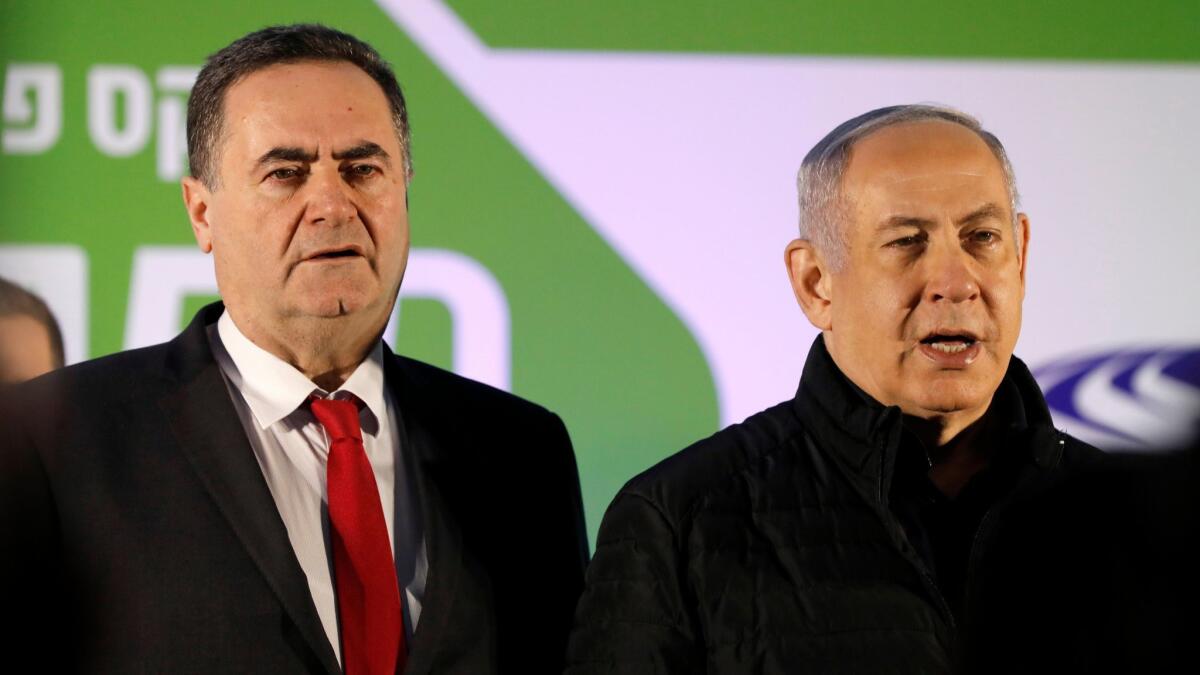Israel’s Netanyahu and his foreign minister enrage Poland with Holocaust finger-pointing; summit collapses

- Share via
Reporting from Jerusalem — Israeli Prime Minister Benjamin Netanyahu’s wager that he could cement his status as a master diplomat by allying himself with a coalition of right-wing Central European countries unraveled on Monday when the Polish and Czech governments pulled out of a Jerusalem summit following a row over Holocaust history.
Netanyahu’s gambit was intended to give him leverage against the majority of European Union states that oppose Israel’s policies toward Palestinians and to highlight his close association with President Trump, who has been critical of the EU and friendly to right-leaning European states.
But comments by Netanyahu and his acting foreign minister prompted the collapse of a summit meeting planned in Jerusalem with members of the Visegrad Group, a coalition consisting of Poland, the Czech Republic, Hungary and Slovakia. The Jerusalem summit, set to begin Tuesday, was the first of the group’s annual meetings to be planned in a non-European country.
From the archives: Central Europe’s 4 Visegrad Nations Knock at EU’s Door »
The cancellation was a stinging defeat for Netanyahu, who faces reelection in April and has staked much of his prestige on his success in, as he puts it, “expanding Israel’s diplomatic horizons.”
Netanyahu had already stirred controversy during a U.S.-sponsored conference on Middle East security that was held in Warsaw last week. He was quoted telling Israeli reporters covering the Warsaw summit that “the Poles cooperated with the Germans” during the Holocaust.
His office subsequently modified the statement by removing a single word — “the” -- to remove the implication that all Poles were complicit. But the revised statement that “Poles cooperated with the Germans” still caused an uproar in Poland, where a 2017 law criminalizes assertions of Polish collaboration with Nazis during the Second World War with sentences of up to three years in jail.
In response, Poland downgraded its representation to the Visegrad event in Jerusalem, announcing that Foreign Minister Jacek Czaputowicz would replace Prime Minister Mateusz Morawiecki at the meeting. But Morawiecki pulled out completely after Israel’s interim foreign minister, Yisrael Katz, refused to clarify his statement that “Polish people collaborated with the Nazis” and that “the Poles were breastfed anti-Semitism by their mothers.”

The breastfeeding remark was a quotation from former Israeli Prime Minister Yitzhak Shamir, whose family was killed during the Holocaust.
After Poland pulled out, Czech Prime Minister Andrej Babis announced his country’s withdrawal from the Jerusalem summit as well.
Israeli foreign ministry spokesman Emmanuel Nahshon said that bilateral meetings between Netanyahu and the Czech, Slovak and Hungarian leaders were still scheduled. And Netanyahu, speaking in Jerusalem on Monday afternoon to leaders of the Conference of Major American Jewish Organizations, called the Warsaw meeting “something spectacular,” and made no mention of the canceled Jerusalem summit.
But the collapse of the summit was an embarrassing setback for Netanyahu, as well as a blow to the Trump administration, which located last week’s Middle East security conference in Warsaw to underscore a realignment of nations opposing the 2015 Iran nuclear deal.
It is not the first time Netanyahu’s acquiescence to the rising wave of Holocaust revisionism in Central Europe has clashed with domestic politics in Israel, where a substantial proportion of the population descends from survivors of Nazi persecution.
Hungarian Prime Minister Viktor Orban, whom Netanyahu lavishly welcomed in Jerusalem last July, is an admirer of Miklos Horthy, the Hungarian leader who collaborated with Nazi Germany to deport almost all of Hungarian Jewry to concentration camps.
At about the same time as the Orban meeting, Netanyahu attempted to smooth over differences with Morawiecki by issuing a joint statement clarifying Poland’s World War II status as a nation under the yoke of German occupation. That statement was slammed by Holocaust historians and Israeli politicians.
Centrist opposition leader Yair Lapid, the son of a Holocaust survivor, defined Netanyahu’s attempt to undo the damage caused by his utterance in Warsaw as “another surrender.”
Daniel Shapiro, the former U.S. ambassador to Israel, said that while “it is perfectly valid for Israel to seek productive relations with nations of all kinds,” there is an inherent tension between “who you can work with and who you identify with.”
“Israel has always identified with the camp of democracies and, of course, it has been faithful to the memory of Jewish people, so that makes it hard to form lasting partnerships with autocratic governments that engage in Holocaust denial, and we’re seeing that tension play out,” he said.
Martin Weiss, the Austrian ambassador to Israel, said the question of Israel’s alliances with European nations struggling to define themselves in the long shadow of the Holocaust is “a philosophical and historical debate Israelis have to hold.”
Netanyahu’s diplomatic strategy, Shapiro said, had shown its limitations.
The group of nations that caucused in Warsaw is not proving to be “a new set of relationships for the framework of Israel’s international relations.”
Tarnopolsky is a special correspondent.
More to Read
Sign up for Essential California
The most important California stories and recommendations in your inbox every morning.
You may occasionally receive promotional content from the Los Angeles Times.













